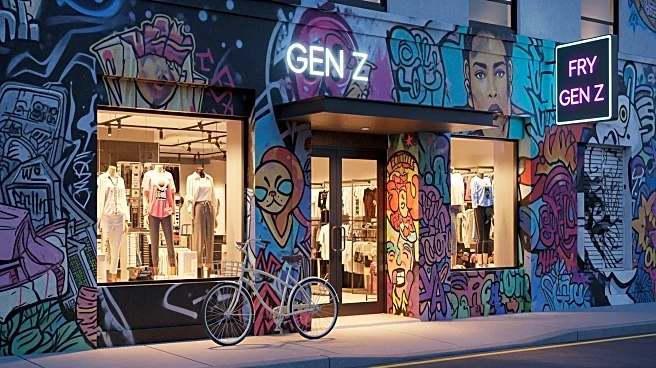What's Happening?
Urban Outfitters is expanding its new store concept, which is tailored to Gen Z shoppers, to additional cities following successful launches in Houston and Glendale, California. The new format features
a modern and flexible design, with plans to extend to Bethesda, Maryland by the end of the year and seven more locations next year. This expansion includes both street and mall locations, with a focus on localized merchandising that reflects the shopping behaviors and preferences of Gen Z consumers. The stores will also see an expansion in beauty assortments and private labels. Urban Outfitters President Shea Jensen emphasized the importance of shaping stores around customer lifestyles and significant moments.
Why It's Important?
The expansion of Urban Outfitters' localized store concept is significant as it reflects a strategic shift to cater to the preferences of Gen Z, a demographic known for valuing unique and personalized shopping experiences. By focusing on localized merchandising and modern store designs, Urban Outfitters aims to strengthen its appeal among younger consumers who are driving traffic to both street-level and mall locations. This move could potentially increase the brand's market share and influence in the retail sector, as Gen Z continues to emerge as a powerful consumer group with distinct shopping habits.
What's Next?
Urban Outfitters plans to continue rolling out its new store concept to additional locations, with a total of eight new stores expected by next year. The company will likely monitor the performance of these stores closely to assess the effectiveness of its localized approach. Stakeholders, including investors and retail analysts, will be watching to see if this strategy successfully boosts sales and customer engagement. The retail industry may also observe Urban Outfitters' approach as a potential model for engaging Gen Z consumers.
Beyond the Headlines
The shift towards a more localized and personalized retail experience highlights a broader trend in the industry where brands are increasingly focusing on customer-centric strategies. This approach not only aims to enhance customer satisfaction but also to build brand loyalty among younger consumers who value authenticity and individuality. The success of Urban Outfitters' strategy could influence other retailers to adopt similar models, potentially leading to a transformation in how retail spaces are designed and operated.











